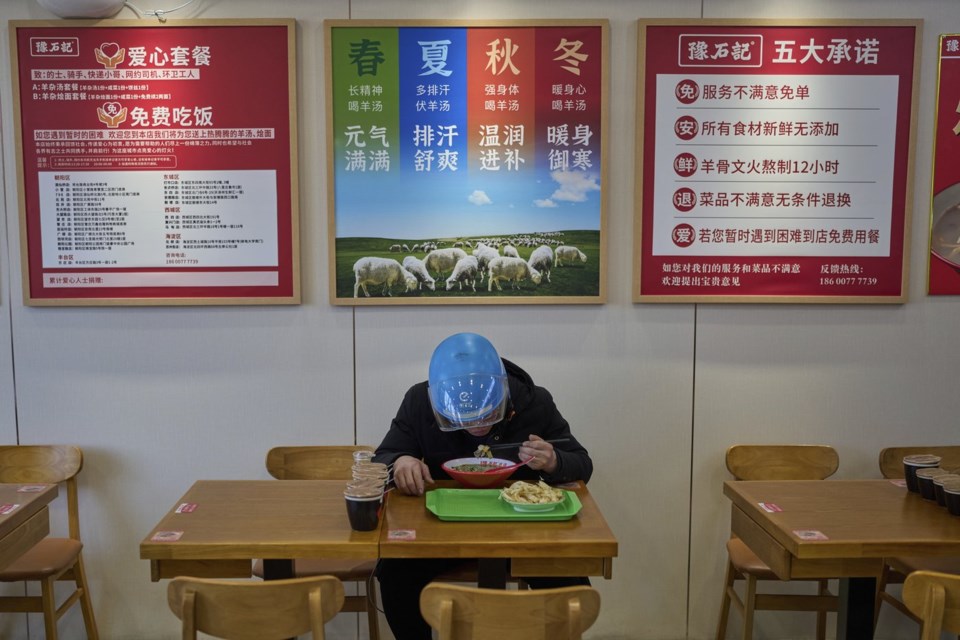BEIJING (AP) — After the lunchtime rush, it's time for to eat.
Liu Lijie, halfway through a 13-hour workday, parked his electric scooter in front of a restaurant in Beijing for his go-to choice, lamb noodle soup with a side of pickles, for 12 yuan ($1.65), a discount of 6 yuan off the regular price.
The reduced-price meal is part of a movement that offers free or discounted meals to , no questions asked.
Known as “aixincan” (eye-sheen-zan), or “loving meals,” they are available at some restaurants in major Chinese cities, home to large populations of migrant workers who come looking for jobs.
“There is a lot of pressure in life since I came to Beijing to work, so eating aixincan is both economical and practical,” said the 40-year-old Liu, who arrived two years ago from nearby Shanxi province.
Eager to get back to earning money, he digs into his meal at a branch of the Yushiji restaurant chain without even stopping to remove his helmet, branded with the name of the popular Ele.me food delivery app.
The movement, also known as “suixincan” or “follow-the-heart meals,” can be traced back to the early 2000s. It has been featured in China's government-run media and on social media, including posts in which influencers pose as hungry customers in need to highlight the generosity of the restaurants.
Luo Shuai, a driver for , China's largest food delivery service, learned of Yushiji’s discounted meal initiative through colleagues and has since become a daily customer at the Beijing chain, which serves food from his native Henan province.
“It reminded me of my hometown,” said the 27-year-old Luo, who moved to Beijing at the end of last year.
Among China's nearly 300 million migrant workers, an such as delivery driving over factory work has emerged in recent years. There are now more than 200 million gig-economy workers, according to government data.
For a full-time driver, the average monthly pay at Meituan can reach more than $1,500. But only 11% of the app's drivers work full-time. Part-timers in the biggest cities, such as Beijing and Shanghai, averaged closer to $1,000 a month in 2024.
The existence of discounted meals reflects a shift in China's urban landscape, according to Xiang Biao, head of the Max Planck Institute for Social Anthropology in Germany.
Previously, migrant workers could carve out their own spaces by helping each other, he said, but those networks have disappeared with the erosion of informal restaurants in cities for hygiene and safety reasons.
“They will have to seek help from strangers,” Xiang said.
The state-implemented cleanup since the late 2000s of “urban villages” — spaces where migrant workers would live that grew alongside urban development — has increased those pressures.
The stigma of asking for free food exists in all societies, Xiang said, though it may not be an issue for delivery drivers in China, as they are already socially marginalized.
Feng Yong, the 43-year-old manager of “Doornail Meat Pie" — so named because its food resembles the round wooden nail covers on classical Chinese doors — spends much of his day kneading, filling and wrapping the pies at the Muslim Chinese restaurant in Beijing.
He said the restaurant began serving aixincan to help people in need and inspire others to do the same. A Shandong province native who moved to the Chinese capital more than 20 years ago, Feng said he has a deep understanding of being an outsider struggling in a new city.
The key, he said, is to avoid any embarrassment for customers who are in need. Some hesitate at the entrance. The staff do what they can to help and don't inquire about a potential customer's circumstances.
“We don’t refuse them anything, just as long as they’re full,” Feng said.
Tian Macleod Ji, The Associated Press




